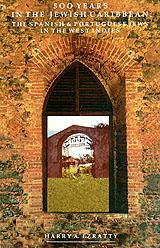
Jews in Paradise
|
This review first appeared in the American Reporter in 1997.
An interesting new book by amateur historian Harry A. Ezratty of Puerto Rico shows that, yes, Jews have been living and working in the Caribbean since Columbus' first voyage. Given the realities of the Inquisition and general hostility toward Jews, they haven't always worn their faith openly, but they've been present nonetheless.
Ezratty breaks the book into chapters based on the nation that owned particular islands: The Dutch Caribbean, the French Caribbean, the Spanish Caribbean, and the Danish and American Caribbean. As Ezratty points out, where the Jews lived in the Caribbean varied from time period to time period, depending on which government ruled which islands and what the law was regarding Jews. For instance, in the Spanish-held islands, the Jews couldn't openly live their faith until after the Spanish-American War.
This isn't a particularly polished or well-written book. Ezratty tends to wander at times, to jump from fact to fact with little narrative. But the information seems solid and well-researched; when he doesn't know something, Ezratty is up-front about that – there are, he admits, large holes in the historic record regarding Jews in the Caribbean. And Ezratty assumes a fairly broad knowledge of Jewish culture – that one knows, say, the differences between Sephardic (Spanish and Portuguese Jews) and Ashkenazic (Eastern European Jews) services.
But even without such knowledge, this is an informative, short overview of a little-known facet of history.

